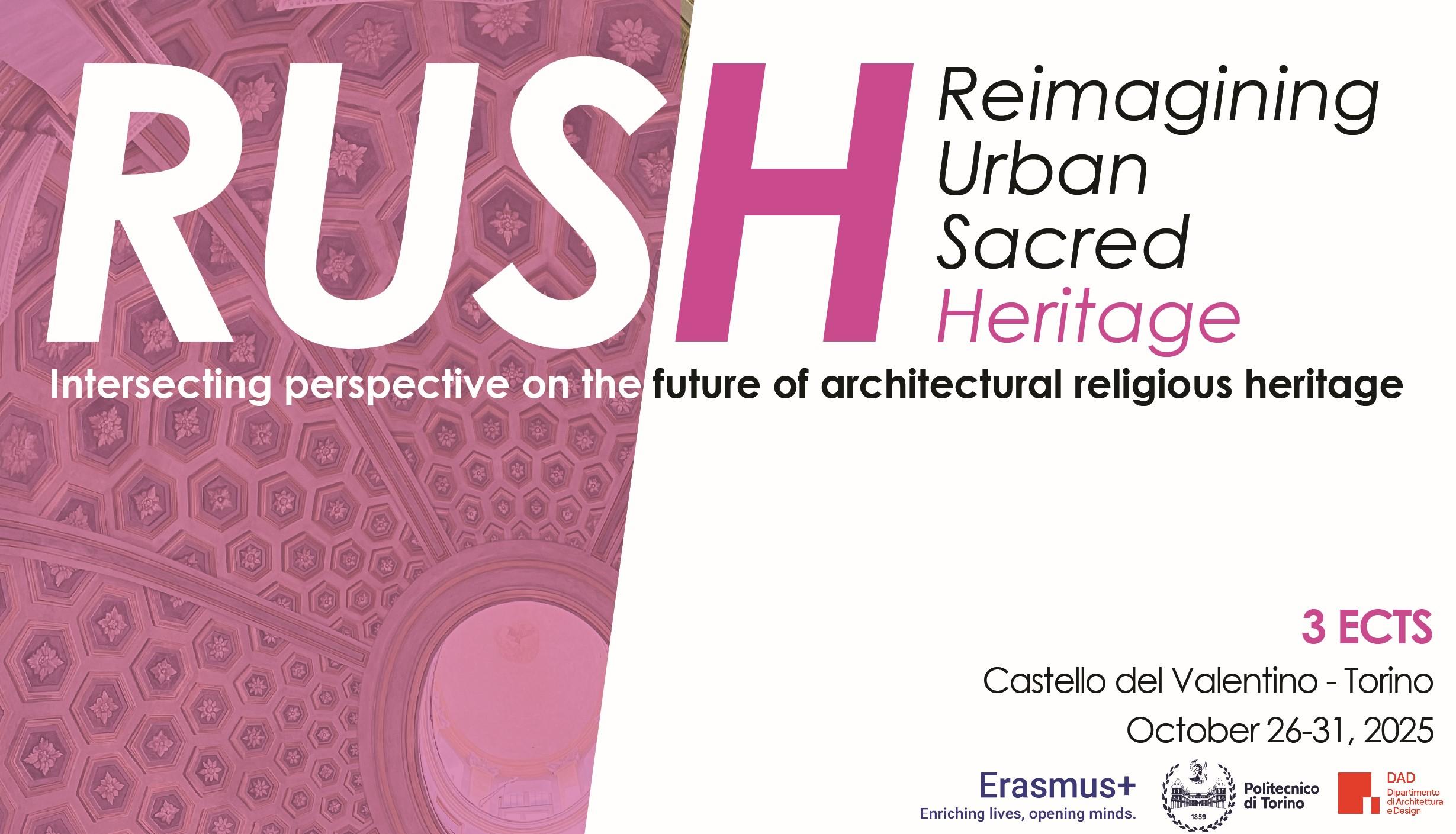Politecnico di Torino, Department of Architecture and Design (DAD), is organizing the first edition of a BIP (Blended Intensive Programme) within the Erasmus + agreement on religious architectural heritage.
Italian historical urban centres are characterized by a high density of religious architectural heritage, including churches, chapels, convents, and monasteries, many of which hold significant artistic and architectural relevance. The growing phenomenon of underuse and abandonment of religious buildings in urban areas is becoming an emerging issue in the field of cultural heritage conservation and preservation, and urban regeneration.
The four universities involved, each with its own approaches and specificities, will share the challenge of reusing and regenerating the religious architectural heritage of Turin's historic center through a critical and immersive reading of the urban reality, the architecture, and the communities, in order to develop regeneration design scenarios.
Partner Universities
- Politecnico di Torino, Italy (coordinator)
- KU Leuven, Belgium
- Faculdade de Arquitectura da Universidade do Porto, Portugal
- Centre for Socioeconomic and Territorial Studies (DINÂMIA'CET-Iscte), ISCTE-Instituto Universitáro de Lisboa, Portugal
- Ion Mincu University of Architecture and Urban Planning, Romania
Patronage
- Fondazione 1563 per l’Arte e la Cultura
- Diocesi di Torino
Dates and location
- Virtual part: October 3, October 10, 2025 (8h)
- In-person training: Turin, Castello del Valentino, October 26-31, 2025
General information
The BIP is open to Bachelor's and Master's students in Architecture. Courses and activities will be held in English.
Students completing the program will achieve 3 ECTS.
Coordination
Francesco Novelli (PoliTO)
Giulia De Lucia (PoliTO)
Partnership
Sven Sterken (Ku Leuven, Belgium)
Rolando Volzone (DINÂMIA'CET-Iscte; Portugal)
Joao Luis Marques (FAUP, Portugal)
Oana Diaconescu (|UAUIM, Romania)
Economic contribution
The BIP doesn’t require any fee and provides mobility and accommodation. The main food costs will be agreed with local facilities.
How to apply
Politecnico di Torino students
The BIP open call admits Politecnico di Torino Bachelor of Science students in:
- Architettura
- Architecture
- Design and Communications
and Master of Science students in
- Architecture Construction City
- Architecture for Heritage
- Architecture for Sustainability
- Systemic Design.
Students are invited to fill in this form https://forms.office.com/e/B2K6L5CW2W (using PoliTO credentials) from September 15th to September 28th 2025 at 11.59 pm CEST uploading a single pdf containing:
- CV in pdf (max 2 pages) with personal information, phone and e-mail
- List of exams (Bachelor's and Master's degree) in pdf, including the name of the professors and the marks obtained (max 1 page)
- Motivation letter in pdf (max 1 page)
Selected students will be contacted by email by October 1st, 2025.
Partner Universities students
Please contact the International Mobility/Erasmus+ office of your university.
Program description
On site training
The in-person training activity is concentrated in 7 days of activities to be carried out in Turin. The following activities are foreseen:
- Guided visit and surveys;
- Lectures by experts;
- Meetings with stakeholders and local actors;
- Meetings with the local community;
- Design and lab activities.
On site extra-didactic activities
The visits to the historic center of Turin and the inspections of the city's main churches will be conducted by faculty members and local professionals, offering students an immersive experience of the architectural context and a more comprehensive understanding of the related issues and challenges. Additionally, opportunities for structured social engagement and dialogue will be organized with stakeholders and key actors operating in the area.
Online activities
- Thematic and logistic introductory meeting;
- Lectures by experts.
Lecturers
- Francesco Novelli, PoliTO
- Giulia De Lucia, PoliTO
- Rolando Volzone, DINÂMIA'CET-Iscte
- Andrea Longhi, PoliTO
- Davide Dimodugno, UniTO
- Caterina Giannattasio, UniCa
- Mariarosaria Villani, UniSa
- Mariateresa Giammetti, UniNa
- Maria Chiara Giorda, Uni Roma 3
- Caterina Pignotti, Sapienza
Teaching methods
- Field study and analysis of the religious heritage in Turin;
- Comparison and discussion of topics through seminar activities;
- Lectures and dialogues with experts;
- Drafting of a project concept based on consultation with stakeholders and local actors;
- Construction of future design scenarios at different scales;
- Presentation and dissemination of the project idea.
Expected Learning Outcomes
At the end of the program, students are expected to:
- Acquire a conscious and in-depth understanding of the complex issues related to the reuse and transformation of religious architectural heritage;
- Promote critical reflection on innovative models and strategic approaches for the regeneration of urban religious heritage;
- Develop analytical and evaluative methodologies at the urban scale, informed by the interpretation of the needs and expectations of local communities;
- Conceive scenarios for adaptive reuse that address ongoing processes of social transformation within urban contexts, the implications of climate change, environmental sustainability requirements, and the objectives of economic sustainability and circular economy principles.

Funded by the European Union. Views and opinions expressed are however those of the author(s) only and do not necessarily reflect those of the European Union or the European Education and Culture Executive Agency (EACEA). Neither the European Union nor EACEA can be held responsible for them.
